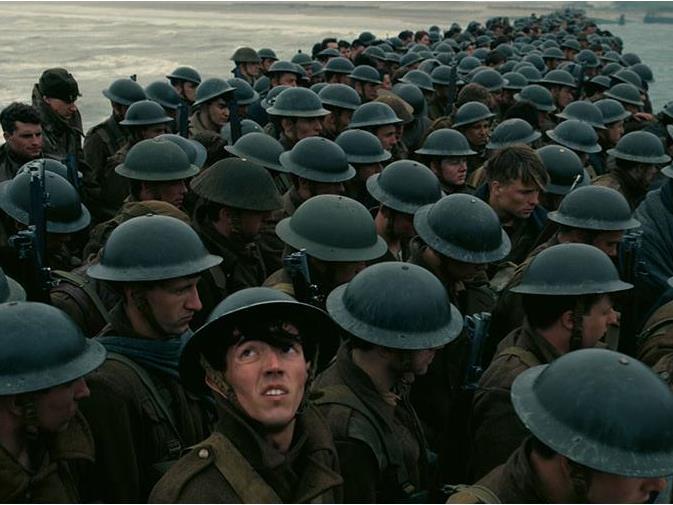On the ground and in the annals of history, war is a numbers game: 400,000 men stranded on a French beach; one wounded soldier on a stretcher taking the space of seven healthy others; 50 gallons of fuel remaining in a soaring Spitfire. Numbers determine strategic plans, tally up the costs and consequences of combat, and commemorate the dead; however they do so with the comfort and safety of distance, be it physical or emotional, focusing on the figures of battle rather than the faces. In Dunkirk, the tenth film from writer/director Christopher Nolan (Interstellar) and his first grounded in real-life events, one helps direct attention towards the other. There’s no overlooking the size and scale of the Second World War evacuation effort that the movie depicts, but seeing the mass of war-time mayhem is meaningless without seeing the individual impact — and vice versa.
Epic yet intimate, Nolan’s account of the 1940 operation adopts three perspectives: land, sea and air. For a week on the packed, bombed shore, young troops (including feature first-timers Fionn Whitehead and Harry Styles, plus Bitter Harvest’s Aneurin Barnard) scramble across sand and water in an attempt to escape via the mole, the pier where naval Commander Bolton (Kenneth Branagh, TV’s Wallander) and army Colonel Winnant (James D’Arcy, Agent Carter) oversee the transfer of troops to vessels. For a day on civilian boat the Moonstone, Dawson (Mark Rylance, The BFG) and his son Peter (Tom Glynn-Carney, The Last Post) sail across the English Channel, with teenager George (Barry Keoghan, Trespass Against Us) tagging along, doing their part after non-military crafts are enlisted to assist. For an hour in the sky, two British air force high-fliers (Tom Hardy, Taboo; Jack Lowden, Tommy’s Honour) endeavour to protect the rescue ships from attacking Luftwaffe planes.
Here, drama seethes with abundance as scared soldiers can’t even try to hide the fear plastered across their boyish faces, ordinary seafarers are thrust into extraordinary circumstances — including picking up a shell-shocked and adrift man (Cillian Murphy, The Party) adamant that he won’t return to France — and those defending the beach from above weave, shoot and weather their diminishing gauges and fortunes. Indeed, any of the trio of crisply intertwined strands could’ve furnished Dunkirk’s narrative alone, or any similar war flick. It’s not the fact that Nolan blends these differing perspectives that stands out, however, but how the applauded filmmaker manages to make a standard feat look anything but. Of course, for those who have been touched by war, discovering that something seemingly routine and commonplace is actually much more than that proves apt. It’s a lesson the feature lets some of its characters learn.
Just like the intricacies discussed between superior officers or fellow pilots, or the nitty gritty of desperate plans debated by men with no other options, it’s the details that matter in Dunkirk. Actually, while conversations remain specific more than general side, that chatter is often swapped for the ratter-patter of weaponry exemplifies the film’s style. Words can’t say as much as the noises of gunfire clanging against metal hulls or aircraft screeching with menace above, or impart the same emotional tension as Hans Zimmer’s (The Boss Baby) expertly crafted combination of ticking, thrumming and droning. And, they certainly can’t say as much as the lifetime of agonising looks flashing through the men’s expressions in what feels like both an instant and a lifetime; it’s one thing to be told that there’s a vast quantity of troops stranded, but it’s quite another to glimpse their individual grief amongst the throng, as cinematographer Hoyte Van Hoytema (Spectre) captures with an eye for both the vast and the personal.
A dynamically sombre spectacle results, though spectacle isn’t the point of a movie finely cobbled together from private moments within the crowd and chaos. Instead, it’s a vivid symphony of visceral experiences that Nolan masterfully conducts, primed and poised to wash over viewers. He lets each of the various ways in which soldiers endured Dunkirk unleash a few bleak notes, then mixes them into a resounding swell of perseverance, endurance and survival. Physically expressive performances, with the younger cast members largely given the stage, complement the stellar craftsmanship in the same way that an orchestra’s featured players might: layering both highlights and textured depths over the main must-see, -feel and -hear onslaught.
Rating: 4 stars out of 5
Dunkirk
Director: Christopher Nolan
Netherlands | UK | France | USA, 2017, 106 mins
Release date: July 20
Distributor: Roadshow
Rated: M
Actors:
Director:
Format:
Country:
Release:





